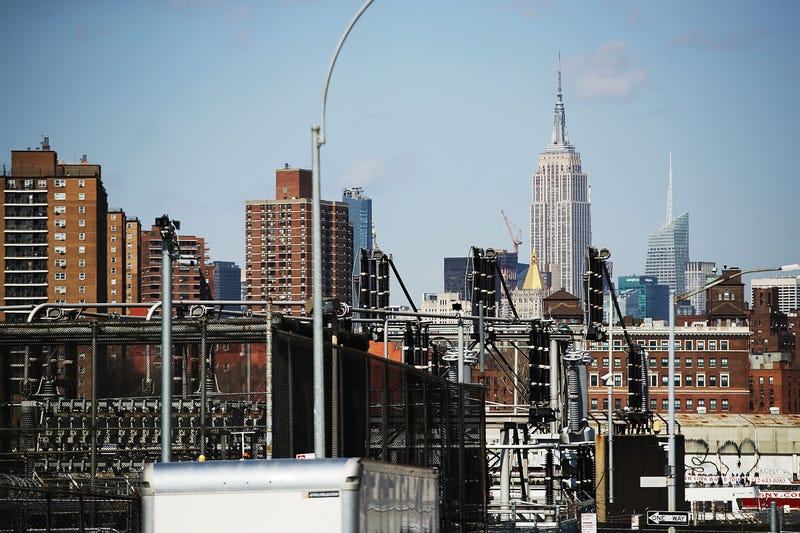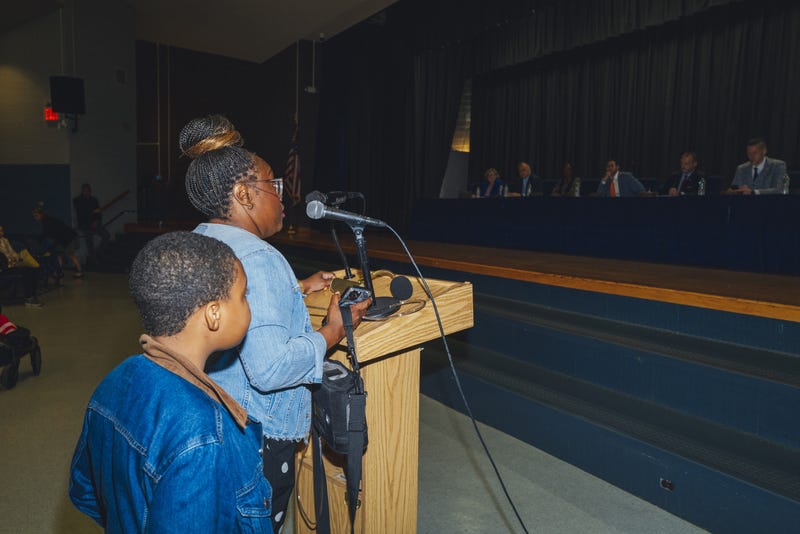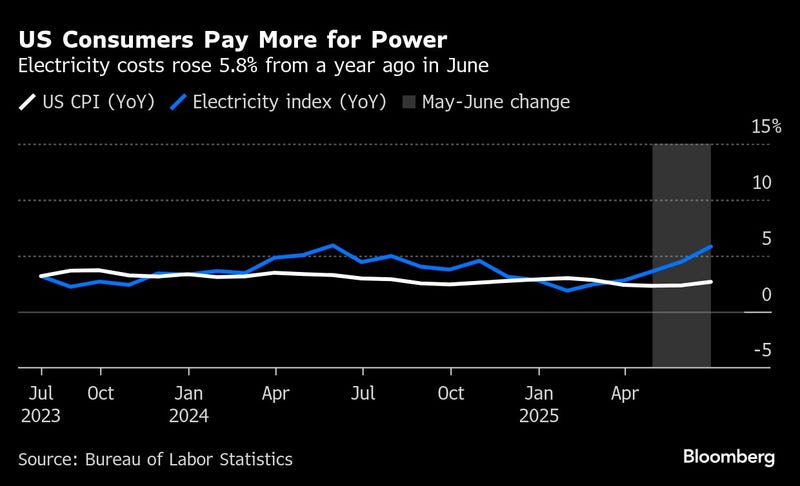
NEW YORK (BLOOMBERG) -- At a meeting to discuss a proposed electricity rate hike for the New York City area in June, Kisha Skipper approached the podium with a portable oxygen concentrator and her 10-year-old son in tow.
“I don’t have to tell you how astronomical my bill already is, and I can’t decide on whether to feed my child or even to buy stationery for school supplies or to pay my own medicine bill,” said Skipper, who uses power to run her oxygen machine after coming down with pneumonia from Covid-19 five years ago.
Skipper was one of dozens of people who attended the hearing in Yonkers, intended to gather public input on Consolidated Edison Inc.’s plan to raise electric bills by more than 11% starting next January and gas charges by more than 10%. ConEd’s proposal has drawn sharp criticism from officials including Governor Kathy Hochul as politicians face pressure to tame rising consumer costs.

Mounting anger over power bills comes as Americans grapple with stubbornly high inflation. Electricity costs nationally have risen 5.8% over the past year, more than double the gains for the broader consumer price index. The boom in artificial intelligence is adding to that increase as power demand from data centers surges, prompting some utility executives to warn of consumer backlash.
Connecticut state police had to investigate threats made against utility regulators last year after a bill hike, while lawmakers and political candidates from Rhode Island to Georgia have slammed utilities for raising rates.
But ConEd says it needs to charge higher rates to fortify the power grid against a growing threat: climate change. From wildfires in California to recent record heat in New York, global warming is fueling extreme weather events that are pushing America’s aging electrical infrastructure to the limit and beyond. ConEd and other utilities argue that if consumers don’t help bear the cost of upgrading that equipment, reliability and clean-energy goals could be at risk.
ConEd wants to raise rates in order to invest more than $21 billion over three years on power transmission and distribution infrastructure — a plan that would boost reliability and support New York’s clean energy goals, including New York City’s target of electrifying most building heating systems by 2050, according to the company.
Ratepayers’ anger over rising bills could prompt ConEd to trim its budget, said Nikki Hsu, an analyst at Bloomberg Intelligence. Fewer capital projects would result in lower revenue for the utility since the more it spends, the more money it makes, she said.
Green spending “probably will be the first one to go,” Hsu said. “That’s the only thing in the toolbox.” And that may slow down the energy transition, she added. ConEd has said it’s guided by New York’s Climate Leadership and Community Protection Act, which aims to achieve 100% zero-emission electricity by 2040.

The staff of the utility regulator, the New York State Public Service Commission, in late May recommended an increase in electricity revenue that was $1.3 billion less than the amount Con Edison is requesting. It also suggested about $395 million less in gas revenue.
The financial strain for ConEd’s ratepayers has been increasing over time, said Laurie Wheelock, executive director and counsel of the Public Utility Law Project, which represents low-income and rural consumers seeking to improve affordability. The utility’s current rate proposal follows increases over the previous three years, including a jump of almost 9% in New York City electric bills and 8.4% for gas heating in 2023.
“We think that the company should have a lower return on equity,” Wheelock said in an interview.
When ConEd proposed the rate increases in January, the company started a complex process that each regulated utility in the US goes through every few years.
In exchange for permission to operate what’s basically a monopoly, utilities agree to extensive oversight from the state. Every three years, ConEd asks for approval to increase bills and then negotiates with parties including regulators, customers and climate advocates over the final figures.

The utility’s proposal includes burying power lines underground and hardening them against extreme weather, along with deploying algorithms and sensors to detect problems early. ConEd also plans to build a substation to serve John F. Kennedy International Airport and support customer electrification, as well as a clean energy hub to provide interconnection points for renewable power.
“Continued infrastructure investments are critical to help us keep service reliable at all times, especially during extreme weather events, which are becoming more frequent,” a spokesman for ConEd said.
ConEd is expected to reach a multi-year deal with the commission, analysts at Jefferies led by Julien Dumoulin-Smith said in a note in late June. The process can take months, but a ruling is expected by year-end.
While the company has raised rates three times in three years, it hasn’t spent its annual profit on desperately needed infrastructure upgrades, New York State Senator Kristen Gonzalez said in an email. But ConEd has said it’s already spent more than $1 billion on storm hardening initiatives since 2012, with more improvements on the way.
“A number of our customers are on lower income or moderate income and it is a heavier burden for them, particularly as we’re investing more toward resiliency and clean and reliability,” ConEd Chief Executive Officer Tim Cawley said at the Reuters Global Energy Transition 2025 conference in New York in June. Those on government subsidies automatically qualify for its incentive programs to keep energy bills at 6% of their income, he said.
Debbie Wangenstein, 62, said in an interview at the public hearing in Yonkers that she’s not eligible for incentives. Rationing power usage, including doing laundry and dishwashing at off-peak hours, hasn’t helped lower her costs. She still gets a bill of almost $800 every month, even after enrolling in a monthly payment plan.
Wangenstein fears the soaring cost of electricity may force her and her husband to sell the home they have been living in since 1984 and move somewhere cheaper.
“I, for one, want to stay here because my kids are here” and she and her husband are likely to have grandchildren, she said.
Skipper said she spends 40% of income on electric and gas bills. She predicts that if ConEd gets approval for the rate increases it’s seeking, consumers will revolt.
“We are going to see mayhem in and around our city and the county if these rates increase any more,” she said.
